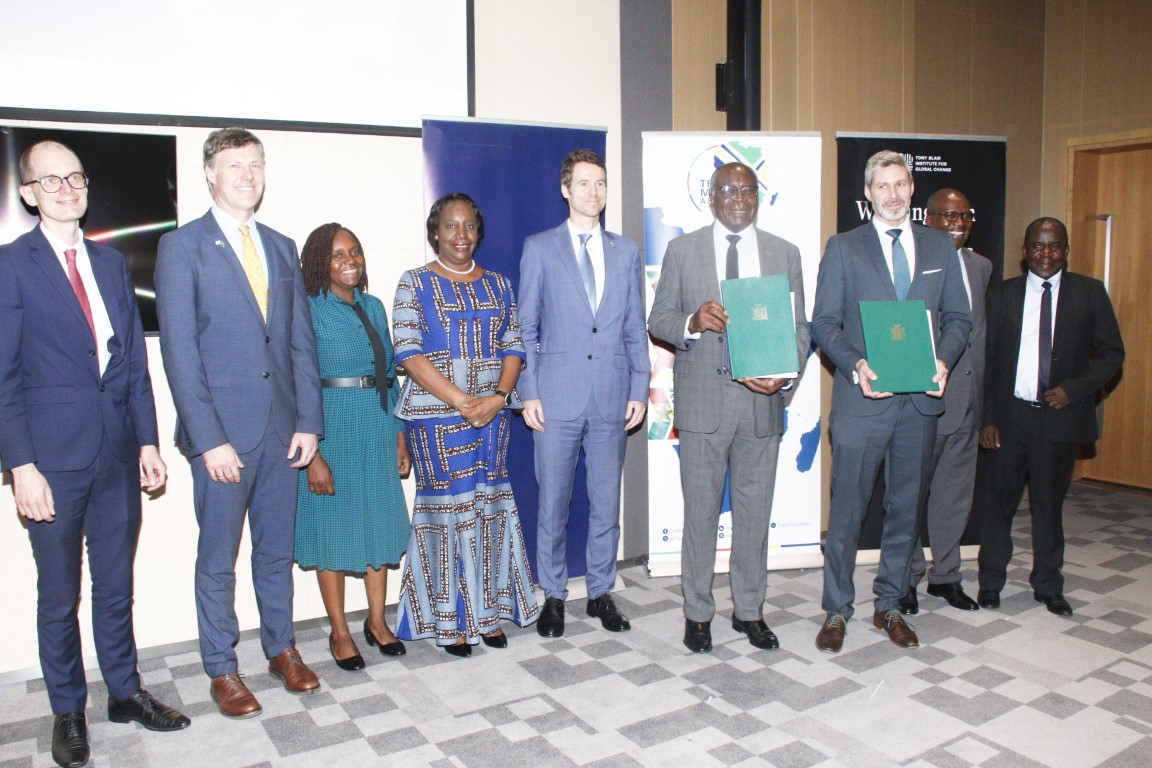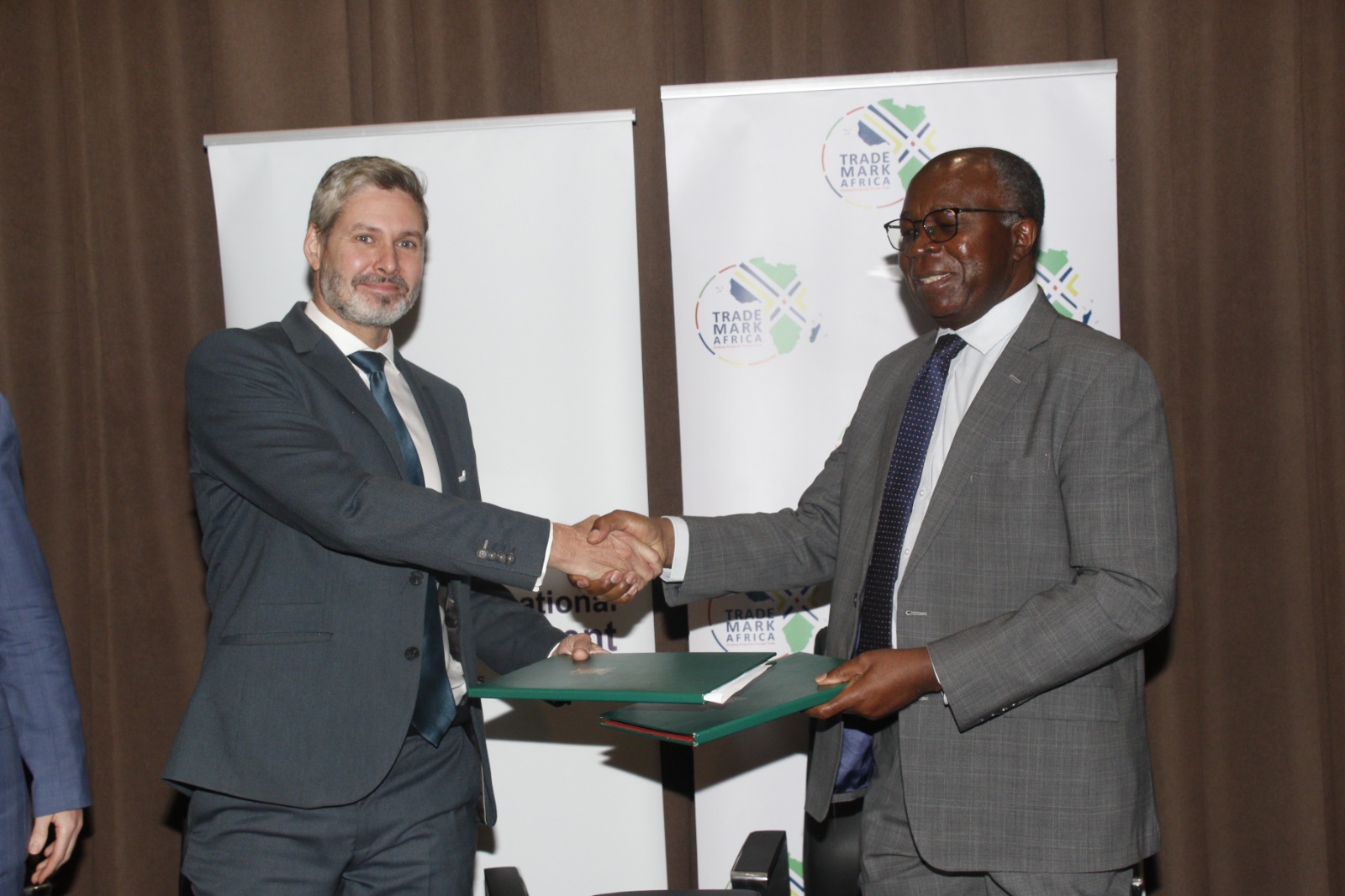- Zambia Government and TradeMark Africa Initiate a ZMK 197 million (£7.1) Million Project
Lusaka, March 20, 2024: The Government of Zambia, represented by the Ministry of Finance and National Planning, and TradeMark Africa (TMA), have entered into a Partner Support Agreement (PSA) to upgrade the Nakonde One Stop Border Post, a key trade route between Zambia and Tanzania. Funded by the UK government, the ZMK 197 million (£7.1 million) project will improve the flow of goods and people along the Dar es Salaam Corridor, promising to streamline operations and reduce cargo clearance times by more than 100% on both sides of the border. Currently, it takes more than two days to clear cargo trucks crossing the border, leading to significant delays and losses for businesses.
Zambia’s Finance Minister, Situmbeko Musokotwane, and TMA’s CEO, David Beer, launched the programme.
Minister Musokotwane highlighted the project’s potential to upgrade infrastructure, decrease congestion, and improve trade flows across the region, saying, “This agreement paves the way for transformative interventions aimed at upgrading infrastructure at Nakonde OSBP, improve border efficiency, reduce congestion and enhance trade facilitation.” He added: “By improving infrastructure at the Nakonde OSBP, we aim to enhance clearance efficiency along the Dar-es-Salaam corridor, reduce time taken to clear both cargo and passengers and ultimately facilitate trade flows.”
The Nakonde Border Post, will see improvements, including upgrade of road infrastructure within the OSBP and truck parking yard, construction of additional office buildings and warehouse, and the installation of a modern, cargo scanner. The initiative also includes the digitisation of clearance processes, and installation of smart gates aimed at cutting dwelling times for cargo trucks from the current average of 55 hours. The design reviews for Nakonde OSBP were finalised over the last one year, with support from Trade Catalyst Africa and the Tony Blair Institute that has supported the process and Government, as well as providing technical support.

TMA CEO, David Beer, underscored the impact of efficient OSBPs on reducing trade times and costs, and enhancing regional integration. Drawing on TMA’s experience in East Africa, Mr Beer expressed confidence in the project’s success and its contribution to a more connected Africa, saying, “There is no denying the effect that integrated, fully operational and efficient OSBPs can have in reducing the time and cost of trade, thereby stimulating cross-border prosperity. Our experience in establishing similar border facilities across East Africa has shown us that such efforts can reduce clearance time by an average of 70%. It’s for this reason that I am happy that we are joining forces today with the Government of Zambia and United Kingdom, in coordination with other partners, to mark this important milestone. The Nakonde One Stop Border Post stands as a crucial milestone on our path to a more interconnected, inclusive and thriving Africa.”
British High Commissioner to Zambia Nicholas Woolley said he was delighted that the UK Government had entered a new partnership with Zambia and TradeMark Africa to upgrade the strategic trade frontier between Zambia and Tanzania: “The Nakonde/Tunduma border is one of the busiest entry/exit points for cargo in and out of Zambia, vital in facilitating international trade and the transport of essential goods such as food, fuel and fertiliser. UK support will include funding for the installation of a new cargo scanner and associated road and customs infrastructure in Nakonde, leading to quicker cargo scans and reducing time spent by lorries at the border. Increased border efficiency will enhance regional integration, attract investment, boost cross border trade, and create jobs.”
In 2021 the UK funded the upgrade of the Tunduma side of the border to a One-Stop Border post including a state-of-the-art cargo scanner.
This initiative is part of TradeMark Africa’s broader efforts to facilitate trade across the continent. With over 15 OSBPs established in East Africa, resulting in an average 70% reduction in border crossing times, per time and traffic evaluation surveys conducted on these border posts, the Nakonde project is set to deepen trade ties between Zambia and its neighbours, leveraging Zambia’s strategic position as a land-linked country reliant on regional ports for its international trade.
Duncan Onyango, the Chief Executive Officer of Trade Catalyst Africa, who supported the design of the OSBP, said, “TCA’s investment in Nakonde OSBP is a strategic choice because not only have borders within Africa acted as key choke points for trade, but they are also extremely expensive to develop and maintain. Long delays at the borders due to inadequate infrastructure and inefficiencies in processing both goods and passenger traffic at the borders have both resulted in significant time and cost being added to both formal and informal trade happening between African countries. The penalties are most stringent for the many landlocked countries as the time delays translate directly into higher consumer prices for food and other imported commodities.”
The project enjoys the support of various stakeholders, including senior government, diplomatic, and development sector officials. Also in attendance were Minister of Commerce, Trade and Industry, Chipoka Mulenga; Minister of Infrastructure, Housing and Urban Development, Charles Milupi; TradeMark Africa Board Chair Amb. Erastus Mwencha; the British High Commissioner to Zambia, Nicholas Woolley; Trade Catalyst Africa CEO Duncan Onyango, Tony Blair Institute Country Director, Maria Mkandawire; the head of the Presidential Delivery Unit, Kusobile Kamwambi; World Bank Country Director for Zambia, Malawi, Tanzania and Zimbabwe Nathan Belete; various Permanent Secretaries, the Commissioner General of Zambia Revenue Authority and the Director General Roads Development Agency, among others.
With rigorous management, monitoring, and evaluation practices in place, the partnership commits to transparency, inclusivity, and sustainability throughout the project’s implementation.
Download file-Ends-















